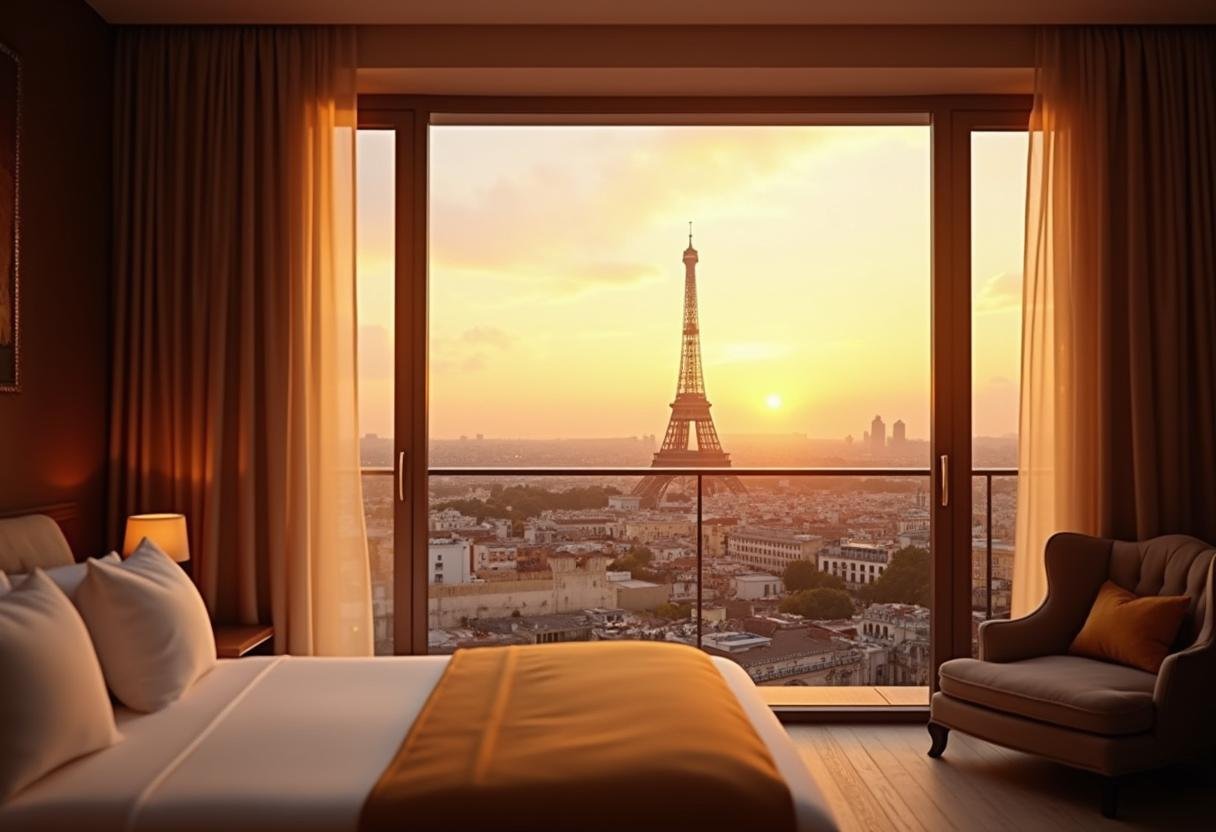Hotels & Accommodations
US Hotel Growth Forecasts Cut for 2025–26 as CoStar and Tourism Economics Warn of Slower Travel Demand

Published on
August 8, 2025 |
By: Tuhin Sarkar
US Hotel Growth Forecasts Cut for 2025–26 as CoStar and Tourism Economics Warn of Slower Travel Demand — this is the reality the hospitality industry is facing right now. US Hotel Growth Forecasts are no longer pointing to the strong upward trend many had hoped for. Instead, forecasts for 2025–26 from CoStar and Tourism Economics have been cut. The reason is clear. These respected analysts now warn that slower travel demand will weigh on hotels across the country.
CoStar has adjusted its figures to reflect a weaker outlook. Tourism Economics has done the same, warning that slower travel demand is becoming a more permanent feature of the market. This change means hotel owners and operators must prepare for tighter margins and more competition for guests. The cut to the US Hotel Growth Forecasts for 2025–26 shows how economic uncertainty, higher costs, and shifting travel habits can reshape an entire industry.
Slower travel demand, as CoStar and Tourism Economics explain, will not stop all growth, but it will make it harder to achieve. Hotels will need to work smarter to attract travellers, maintain rates, and protect profits. The forecast cut for 2025–26 is a signal to the industry to adapt now. Those who take the warnings from CoStar and Tourism Economics seriously will be better placed to navigate slower travel demand and still succeed in a changing market.
A Softer Road Ahead for US Hotels
The US hotel sector is preparing for a slower pace of growth in 2025 and 2026. CoStar and Tourism Economics have revised their forecasts down. They expect demand, Average Daily Rate (ADR), and Revenue Per Available Room (RevPAR) to grow less than first predicted. Profit levels remain stable, but margins are under strain. These updates were shared at the 17th Annual Hotel Data Conference.
The reason for the cut is clear. The economy is showing signs of slower momentum. Inflation is still high. International visitor numbers are not growing as fast as expected. Business and consumer spending is also softer. These factors are affecting how many people travel, how long they stay, and how much they spend on hotels.
What the Numbers Now Show
The changes to the forecast are measurable. For 2025, demand growth has been reduced by 0.6 percentage points. ADR growth is down by 0.5 points. RevPAR growth is lower by 1.1 points. For 2026, demand is cut by 0.5 points, ADR by 0.3 points, and RevPAR by 0.7 points.
GOPPAR, which is Gross Operating Profit Per Available Room, is unchanged. But margins will shrink. Forecasts now suggest a 0.3 percentage point drop in 2025 and a 2.3 point drop in 2026. Food and beverage costs are the biggest risk. Labour, energy, and supply chain costs also remain high.
The US hotel industry is heading for slower growth in 2025 and 2026. CoStar and Tourism Economics have cut their forecasts, signalling weaker demand ahead. The announcement was made at the 17th Annual Hotel Data Conference. Key measures like demand, Average Daily Rate (ADR), and Revenue Per Available Room (RevPAR) are all set to drop. Demand is expected to fall by 0.6 percentage points in 2025 and 0.5 in 2026.
The downgrade reflects the impact of persistent inflation and changing travel behaviour. It also shows that global trade and political uncertainty are shaping travel patterns. While the drop is modest, it comes at a time when hotels are already adjusting to slower international arrivals and tighter consumer spending.
Why the Forecast Has Been Cut
Amanda Hite, president of STR, explained that inflation remains a key factor. Travellers are more cautious with spending. Tough calendar comparisons with previous peak years also make growth harder to achieve. Travel patterns are shifting, with shorter booking windows and fewer extended stays.
These trends are hitting hotel performance across both leisure and business travel segments. The slowdown is not only about fewer guests but also about how much they are willing to spend per stay. Even with these headwinds, industry leaders believe recovery is still possible in the medium term.
Inflation and Travel Patterns Shape 2025 Outlook
Persistent inflation continues to eat into both consumer and corporate travel budgets. Higher prices for flights, food, and experiences have forced many travellers to shorten trips or downgrade hotel choices. This shift reduces ADR growth potential and impacts revenue targets.
Hotels are seeing a change in demand sources. While domestic leisure travel remains resilient, business travel and group bookings have yet to return to pre-pandemic levels. These patterns have made forecasting more complex and forced operators to rethink pricing strategies.
Tariffs and Trade Talks Add to Industry Uncertainty
Aran Ryan from Tourism Economics noted that while the US economy is slowing, it should avoid recession. The bigger concern is the drag from tariffs and ongoing trade negotiations. Tariffs can affect travel indirectly by increasing costs for imported goods and reducing overall consumer confidence.
The conclusion of trade talks could lift sentiment and help stabilise hotel performance. For now, uncertainty over policy direction continues to limit investment and expansion plans for many hotel operators. This environment makes it harder for the industry to commit to large-scale developments.
RevPAR and ADR Growth Lose Momentum
The revised forecast points to slower growth in key performance indicators. RevPAR, a crucial measure of hotel health, is expected to grow more slowly than previously projected. ADR will also face pressure as operators work to keep rooms filled amid softer demand.
For many hotels, the focus in 2025 will be on maintaining occupancy while protecting profitability. This could mean more targeted promotions, dynamic pricing strategies, and a sharper focus on value-added services to attract guests. The competitive landscape will become more intense as operators fight for market share.
ADR and RevPAR Lose Pace
ADR is still expected to rise in 2025 and 2026. But the pace of increase will be slower. This means hotels may not be able to raise rates as much as they did in the last two years. RevPAR, which combines occupancy and ADR, will also grow more slowly.
Hotels will need to be more creative in pricing. Offering value-added packages, loyalty rewards, or flexible booking terms may help keep occupancy up while protecting ADR. Revenue managers will have to focus on balancing price and volume to avoid losing market share.
Margins Under Pressure
Even with stable GOPPAR, hotel margins are forecast to shrink. The main reason is rising costs. Food and beverage departments are under particular strain. Ingredients cost more. Labour costs are climbing. Energy prices remain high.
Hotels will need to find ways to operate more efficiently. This could mean adjusting menus, reducing waste, and using technology to manage staffing. Savings in these areas can help offset higher costs without hurting the guest experience.
The Impact of Tariffs and Trade
Trade disputes and tariffs are an added layer of uncertainty. They can raise costs for imported goods used in hotels, from food to furniture. They can also reduce consumer confidence, making people less likely to travel.
The conclusion of trade talks could bring a lift in sentiment. For now, operators remain cautious about investing in new projects until the policy environment becomes clearer.
The Role of International Travel
International visitors are key to many US markets. Cities like New York, Miami, Los Angeles, and San Francisco depend on overseas travellers for a large share of their hotel business. Visa delays, higher airfares, and political issues have slowed the return of these guests.
Marketing efforts abroad could help. Tourism boards and hotel brands are already targeting campaigns to bring more visitors from Europe, Asia, and South America. If successful, this could ease some of the pressure on urban hotel performance.
Preparing for a Slower Market
Hotels can still succeed in a slower growth market. The focus should be on attracting domestic travellers, enhancing loyalty programmes, and building strong relationships with corporate clients. Flexible pricing can help keep occupancy stable.
Working with event organisers, airlines, and attractions can also create new demand. Bundled deals and cross-promotions can give guests more reasons to book.
GOPPAR Stable but Margins Under Pressure
While the Gross Operating Profit Per Available Room (GOPPAR) forecast remains unchanged, profit margins are expected to tighten. Rising expenses, especially in food and beverage operations, are the main concern. Labour costs, energy prices, and supply chain pressures are also contributing factors.
Hotels may need to adjust service models to manage these costs without damaging guest satisfaction. This could include menu adjustments, energy efficiency upgrades, and selective staffing changes. Operators will have to balance cost control with maintaining the quality of guest experiences.
Policy Shifts Could Lift 2026 Recovery
Both CoStar and Tourism Economics expect conditions to improve in 2026. Tax cuts and reduced policy uncertainty could boost consumer spending and corporate travel budgets. This would help demand recover and support better performance for ADR and RevPAR.
A stabilising global economy and improved trade relations could also encourage more international travel to the US. For now, hotel operators will need to navigate a challenging year while positioning themselves for a possible rebound.
The Role of International Visitors in Growth
Declining international visitor numbers have been a notable factor in the 2025 downgrade. Visa delays, higher travel costs, and geopolitical issues have slowed inbound tourism. This impacts major US cities more heavily, where overseas travellers make up a significant portion of hotel demand.
If inbound travel improves in late 2025 and into 2026, it could give the hotel sector a much-needed lift. Tourism boards and hotel brands are expected to increase overseas marketing efforts to capture this opportunity.
Strategies Hotels Can Use to Offset Slowdown
Hotels can still find growth opportunities despite the weaker forecast. Focusing on domestic markets, leveraging loyalty programmes, and investing in targeted digital marketing can help maintain occupancy. Flexible pricing and tailored packages can also draw in travellers seeking value.
Partnerships with airlines, attractions, and event organisers could generate new demand streams. Hotels that adapt quickly to changing travel patterns will be better placed to outperform in a slower market.
Industry Remains Cautiously Optimistic
Despite the downgrade, industry leaders are not predicting a downturn as severe as past crises. The fundamentals of US tourism remain strong. There is still steady demand for leisure travel, and business travel is slowly recovering.
The key for 2025 will be resilience and adaptability. Hotels that manage costs, maintain service quality, and stay aligned with evolving guest needs can still achieve healthy performance even in a softer growth environment.
Long-Term Growth Still Possible
While 2025 will be a year of slower growth, the long-term outlook for the US hotel sector remains positive. Economic cycles are natural, and recovery periods often lead to innovation and stronger business models.
Investments in technology, sustainability, and guest experience will be critical in shaping the industry’s future. Those who prepare now will be best positioned to capture market share when demand accelerates again.
Hotels & Accommodations
Cases booked against 4 hotels

Tirupati: The Food Safety and Legal Metrology department jointly inspected hotels and restaurants and bars in the city on Thursday.
As many as 18 teams of officials of the two departments inspected 36 hotels and collected 35 samples of various food items for examination. While 26 kg of food item that were found unfit for consumption were destroyed.
Joint food controller Poorna Chandra Rao said cases were registered against the management of four hotels and improvement notices were issued to 14 restaurants. Action will be taken as per law after the results of the samples, which were sent for examination, are received, he added.
Hotels & Accommodations
Paris, Nice, And Marseille Dominate Luxury Hotel Bookings In France

Published on
August 8, 2025 |
By: TTW News Desk
France has regained its status as the top choice for luxury hotel bookings in July 2025, according to recent data from the Global Travel Collection. The data reflects bookings made by luxury travel advisors from both the U.S. and the U.K. It shows a 64% year-over-year increase in bookings for France, making it the most popular European destination for high-end travelers. This increase comes as Paris, Nice, and Marseille become the leading cities, pushing Italy into second place for the first time in years.
This shift in interest highlights a growing appeal for French destinations. It is the first time France has outpaced Italy in luxury bookings since 2019. For those looking for the finest accommodations and experiences, the rise in French bookings signals the country’s lasting attraction in the high-end tourism market.
The Rise of France: Paris, Nice, and Marseille Lead
The figures for July 2025 show that Paris remains the crown jewel of French tourism, with 2,710 nights booked in its top luxury hotels. Paris is known for its iconic landmarks, upscale shopping areas, and world-class dining options. These factors continuously attract tourists seeking an exceptional cultural experience. Hotels like Le Bristol Paris, a symbol of elegance, and Oetker Hotels, which provide Parisian sophistication, are favorites among travelers.
Following Paris, Nice ranked second in bookings, with 1,313 nights reserved. Nice is a Mediterranean paradise, celebrated for its stunning coastline, charming streets, and lively French Riviera vibe. Luxury hotels like The Maybourne Riviera, overlooking the Mediterranean Sea, offer guests outstanding views and lavish experiences.
Marseille, the third most popular destination in France for luxury bookings, accounted for 286 nights in July. This historic port city, with its rich cultural background, is becoming a favorite for tourists seeking an authentic Mediterranean experience paired with luxury.
The Italian Competition: Italy Takes Second Place
While France has climbed to the top, Italy remains a major destination for high-end travelers, holding the second position in luxury bookings. Rome, Milan, and Naples were among the most booked cities for luxury stays in Italy, with 777 nights reserved in Rome, 725 nights in Milan, and 679 nights in Naples.
Rome, known for its timeless history and vibrant energy, continues to be a popular choice. Hotels like Hotel Eden, located in the heart of the city, and Passalacqua, on Lake Como’s shores, keep attracting those looking for luxurious, intimate experiences in Italy’s capital.
Milan, recognized as Italy’s fashion and design hub, also brought in a significant number of luxury travelers in July. Romazzino, a Belmond Hotel on Sardinia, is a top pick for those seeking a glamorous getaway.
The U.K. and Spain: Close Contenders in the Rankings
The United Kingdom performed well in the rankings, landing in third place with a 13% increase in luxury bookings compared to July 2024. London is still the main hub for luxury travel, with standout hotels like Soho’s Ham Yard Hotel, the iconic art deco Claridge’s, and the exclusive Flemings Mayfair continuing to draw high-end tourists. These hotels, noted for their unique designs and luxurious services, provide unmatched experiences for travelers visiting the U.K.
Meanwhile, Spain is gaining popularity, with Barcelona and the Balearic Islands emerging as favorites for luxury travelers. Barcelona attracted many high-end visitors, with hotels such as the Majestic Hotel & Spa, Mandarin Oriental Barcelona, and Le Meridien Barcelona being popular choices. Demand for luxury stays in Ibiza also grew, with notable hotels like the Nobu Hotel Ibiza Bay and Six Senses Ibiza leading the way.
The Growing Trend of Balanced European Travel Demand
Increased interest in France has shifted the previous dominance of Italian tourism. Angie Licea, President of Global Travel Collection, notes that the rise in French luxury bookings shows a growing demand for diverse destinations across Europe. For years, Italy led the luxury travel market, but France’s recent growth indicates that travelers are exploring a wider range of European locations.
This trend benefits places like Nice, Marseille, and Reykjavík, which were once overshadowed by well-known Italian cities. The French Riviera and the historic areas of Marseille now have a spot on the luxury travel map, providing new and exciting opportunities for travelers seeking different experiences.
Conclusion: A Positive Shift for European Tourism
The latest data from Global Travel Collection underscores a significant shift in the European luxury travel market. With France rising to the top, led by Paris, Nice, and Marseille, the competition with Italy suggests a positive movement toward more diverse European travel. This trend is encouraging for tourism overall, indicating that travelers are discovering new destinations and spreading their visits more evenly across the continent.
For tourism professionals and travelers, this new dynamic in European luxury tourism offers an exciting future for those seeking the best in high-end accommodations, unique cultural experiences, and stunning scenic views. With France leading in bookings and other countries following, the future of luxury European travel looks bright for both established and emerging destinations.
(Source: Global Travel Collection, Hellenic Chamber of Hotels, U.S. and U.K. Luxury Travel Advisors, Rightmove, Lloyds Bank)
Hotels & Accommodations
Millennium Hotels and Resorts Crowned Singapore’s Most Valuable Hotel Brand for the Second Consecutive Year

SINGAPORE, Aug. 8, 2025 /PRNewswire/ — Millennium Hotels and Resorts (MHR) has once again been named Singapore’s most valuable hotel brand in the Brand Finance Hotels 50 2025 global ranking. Valued at USD 421 million, MHR climbed three positions to rank 31st globally, reaffirming its leadership in the international hospitality landscape and its continued commercial momentum.
This marks the second consecutive year that MHR has been featured in the global top 50, having ranked 34th in the 2024 edition, further cementing its standing as Singapore’s leading hospitality brand on the world stage.
Together with sister brand Copthorne, which recorded a brand value of USD 223 million, the combined brand value of Millennium and Copthorne now stands at USD 644 million, underscoring the strength of the group’s overall portfolio and strategic brand focus.
This accolade reflects MHR’s strategic transformation over the past year – a transformation led by innovation, digital enablement, and guest-centric growth. From the rollout of AI-powered assistants AVA and Ask Millie to full GSTC certification across all Singapore hotels, and a revitalised MyMillennium loyalty programme, the brand continues to lead with relevance in today’s competitive travel landscape. The brand also recently launched M Social Resort Penang in July, with M Social Hotel New York Downtown set to open this October and M Social Hotel Sunnyvale, Florida slated for launch in Q1 2026 expanding its lifestyle offering in key gateway markets.
Kwek Leng Beng, Executive Chairman of City Developments Limited said:
“Developing a strong and reputable brand is my priority. While growing the number of hotels is important, it’s the strength of the brand that drives sustainable growth and differentiates us in a competitive market. My personal vision is to expand our group’s portfolio globally with hundreds of Singapore flags flying in key cities around the world.”
Alex Haigh, Managing Director Asia Pacific, Brand Finance, commented:
“Millennium Hotels and Resorts’ position as one of only two Southeast Asian brands in the global top 50 hotels ranking speaks volumes about its strength in the region. Its focus on smart innovation, sustainability, and guest-centric experiences has not only made it Singapore’s most valuable hotel brand, but also a standout force in the regional hospitality landscape.”
“Being named Singapore’s most valuable hotel brand is a proud moment for us, and a powerful validation of the work our teams have done across the board,” said Kwek Eik Sheng, Executive Director, Millennium Hotels and Resorts. “This recognition reflects the value of our people, affirms our brand strength and supports our long-term vision to build a future-ready hospitality brand that is globally competitive and locally respected.”
Saurabh Prakash, Interim Chief Operating Officer and Chief Commercial Officer, Millennium Hotels and Resorts, added:
“This achievement is the result of deliberate and focused strategy one that is deeply aligned with our Chairman Mr Kwek Leng Beng’s Blue Ocean vision. On the back of MyMillennium being named a winner at the Travel + Leisure Loyalty Awards, this latest recognition further affirms the strength of our brand and loyalty proposition. We are shaping a bold new chapter for Millennium Hotels and Resorts, investing in differentiated experiences across rooms, dining, and loyalty. Our goal is to break category conventions and elevate the brand across all our markets.”
With a presence in over 80 destinations and a growing portfolio of more than 145 hotels, MHR remains firmly on track to support the group’s long-term ambition of scaling to 500 hotels globally through strategic partnerships, market-driven growth, and brand-led innovation.
Millennium Hotels and Resorts (MHR)
Millennium Hotels and Resorts (MHR) is a dynamic, global hospitality group with properties spanning four continents and 80 destinations. With a reputation for excellence, MHR owns, manages, and operates over 145 properties worldwide including in New York, Los Angeles, London, Paris, Dubai, Abu Dhabi, Auckland, Beijing, and Singapore. Its diverse portfolio spans brands including The Biltmore, Grand Millennium, Millennium, M Social, Studio M, M Hotel, Copthorne, and Kingsgate—offering the perfect address for business and leisure travellers who are looking for hospitality experiences that go above and beyond. MHR is a Hong Leong Group subsidiary of Singapore-listed global real estate company City Developments Limited. For more information, visit www.millenniumhotels.com.
MyMillennium
Explore the world and be rewarded with MyMillennium, the global loyalty programme from Millennium Hotels and Resorts. With over 4 million members, MyMillennium allows you to earn and redeem points at over 145 participating hotels across Asia-Pacific, the UK, USA, and the Middle East. Members can earn MyPoints on their stays and dining, and redeem them for rewards like complimentary nights, room upgrades, dining discounts, and more. The programme consists of three membership tiers—Classic, Silver, and Prestige—each offering exclusive perks as members progress. In addition, MyMillennium BIZ offers corporate bookers tailored rewards on their business travels and events, making MyMillennium a versatile and rewarding loyalty programme for both leisure and business travellers.
Sign up at www.millenniumhotels.com/en/programmes/my-millennium/.
-

 Brand Stories3 weeks ago
Brand Stories3 weeks agoBloom Hotels: A Modern Vision of Hospitality Redefining Travel
-

 Brand Stories2 weeks ago
Brand Stories2 weeks agoCheQin.ai sets a new standard for hotel booking with its AI capabilities: empowering travellers to bargain, choose the best, and book with clarity.
-

 Destinations & Things To Do3 weeks ago
Destinations & Things To Do3 weeks agoUntouched Destinations: Stunning Hidden Gems You Must Visit
-

 Destinations & Things To Do2 weeks ago
Destinations & Things To Do2 weeks agoThis Hidden Beach in India Glows at Night-But Only in One Secret Season
-

 AI in Travel3 weeks ago
AI in Travel3 weeks agoAI Travel Revolution: Must-Have Guide to the Best Experience
-

 Brand Stories1 month ago
Brand Stories1 month agoVoice AI Startup ElevenLabs Plans to Add Hubs Around the World
-

 Brand Stories4 weeks ago
Brand Stories4 weeks agoHow Elon Musk’s rogue Grok chatbot became a cautionary AI tale
-

 Brand Stories2 weeks ago
Brand Stories2 weeks agoContactless Hospitality: Why Remote Management Technology Is Key to Seamless Guest Experiences
-

 Asia Travel Pulse1 month ago
Asia Travel Pulse1 month agoLooking For Adventure In Asia? Here Are 7 Epic Destinations You Need To Experience At Least Once – Zee News
-

 AI in Travel1 month ago
AI in Travel1 month ago‘Will AI take my job?’ A trip to a Beijing fortune-telling bar to see what lies ahead | China













You must be logged in to post a comment Login